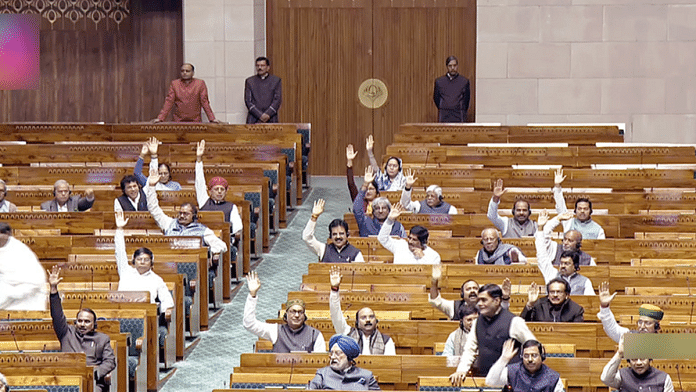New Delhi: Keeping over-the-top (OTT) applications such as WhatsApp and Telegram outside the ambit of the bill, mandating biometric identification for issuing SIM cards, and paving the way for satellite spectrum to be allocated by the government. These are among the salient features of the draft Telecommunications Bill, 2023, which was introduced in Lok Sabha Monday.
The proposed law, if passed, will also allow the government to take over or suspend any or all telecommunication services or networks in the interest of national security. A similar provision was included in the previous version of the bill as well.
Keeping OTTs out of the proposed law’s ambit is a departure from its previous iteration. The draft bill, which seeks to replace the existing legal framework that governs the telecom sector, comprising the Indian Telegraph Act, 1885, the Wireless Telegraphy Act, 1933, and the Telegraph Wires (Unlawful Possession) Act, 1950, also authorises the government to cut off telecommunications with a particular country, should it deem it necessary in the interest of national security.
The latest version of the draft bill was cleared by the Union Cabinet in August this year.
The regulation of OTTs was among the most contentious issues in the earlier draft bill, with telecom services providers such as Bharti Airtel, Reliance Jio, and Vodafone Idea pushing to bring OTTs under the regulatory regime to ensure a level playing field.
The proposed bill says that telecommunication “means transmission, emission or reception of any messages, by wire, radio, optical or other electro-magnetic systems, whether or not such messages have been subjected to rearrangement, computation or other processes by any means in the course of their transmission, emission or reception”.
While this is a narrower definition than what was included in the previous version of the bill, experts have pointed out that it is still very wide, and may be interpreted to include internet-based services, even though the words OTT have been dropped.
In the earlier version of the draft bill, which was released for public consultation in September 2022, the definition of “telecommunication services” was expanded to include broadcasting services, e-mail, video and data communication services, satellite-based communication services, and internet-based communication services and OTT services.
According to sources, OTTs were removed from the ambit of this draft bill as regulation of internet-based services comes under the purview of the Ministry of Electronics and Information Technology (MeitY).
Also Read: Modi govt again extends feedback deadline for telecom bill, list of concerns grow
Take over for national security
The latest version of the bill says that the central government may, “if satisfied that it is necessary or expedient so to do, in the interest of national security, friendly relations with foreign states, or in the event of war” take actions that include “taking over the control and management of, or suspending the operation of… any or all of any telecommunication services, or any telecommunication network or part thereof”.
The national security clause also allows the government to issue directions regarding the “suspension, removal or prohibition of the use of specified telecommunication equipment and telecommunication services from countries or person as may be notified”.
The latest draft bill also puts to rest another contentious issue, that of spectrum allocation for satellite-based telecom services. It allows for the allocation of spectrum for such services through an administrative process, without an auction.
These services include “Teleports, Television channels, Direct To Home, Headend In The Sky, Digital Satellite News Gathering, Very Small Aperture Terminal, Global Mobile Personal Communication by Satellites, National Long Distance, International Long Distance, Mobile Satellite Service in L and S bands,” the draft bill states.
The industry was divided over the issue of whether satellite-based services providers should be provided spectrum administratively or through auctions. While telcos like Reliance Jio and Vodafone Idea have argued that satellite spectrum should be auctioned to provide a level-playing field, Bharti Airtel has supported administrative allocation.
The proposed law outlines 19 cases where spectrum can be administratively allocated, including for national security and defence, law enforcement and crime prevention, public broadcasting services, promoting scientific research, resource development, and exploration, safety and operation of transport systems, use by central government/state governments, in-flight and maritime connectivity, among others.
The draft bill also makes biometric-based identification mandatory for the purchase of SIM cards. “Any authorised entity which provides such telecommunication services as may be notified by the central government, shall identify the person to whom it provides telecommunication services through use of any verifiable biometric-based identification as may be prescribed,” it says.
The draft bill also paves the way for the government to prescribe rules for the protection of users from spam messages, including measures such as getting prior consent of users for receiving certain messages and introducing mechanisms to enable users to report any malware or specified messages.
Telcos will need to establish an online mechanism to enable users to register any grievance related to the telecommunication service.
(Edited by Uttara Ramaswamy)
Also Read: Data protection bill, which sparked privacy concerns, passes in Lok Sabha



